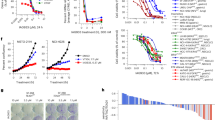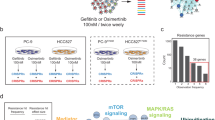Abstract
Fragile histidine triad (FHIT) loss by the two-hit mechanism of loss of heterozygosity and promoter hypermethylation commonly occurrs in non-small cell lung cancer (NSCLC) and may confer cisplatin resistance in NSCLC cells. However, the underlying mechanisms of FHIT loss in cisplatin resistance and the response to cisplatin-based chemotherapy in NSCLC patients have not yet been reported. In the present study, inhibition concentration of 50% cell viability induced by cisplatin (IC50) and soft agar growth and invasion capability were increased and decreased in FHIT-knockdown and -overexpressing cells, respectively. Mechanistically, Slug transcription is upregulated by AKT/NF-κB activation due to FHIT loss and, in turn, Slug suppresses PUMA expression; this decrease of PUMA by FHIT loss is responsible for cisplatin resistance. In addition, cisplatin resistance due to FHIT loss can be conquered by AKT inhibitor—perifosine in xenograft tumors. Among NSCLC patients, low FHIT, high p-AKT, high Slug and low PUMA were correlated with shorter overall survival, relapse-free survival and poorer response to cisplatin-based chemotherapy. Therefore, the AKT inhibitor perifosine might potentially overcome the resistance to cisplatin-based chemotherapy in NSCLC patients with low-FHIT tumors, and consequently improve the outcome.
This is a preview of subscription content, access via your institution
Access options
Subscribe to this journal
Receive 50 print issues and online access
$259.00 per year
only $5.18 per issue
Buy this article
- Purchase on Springer Link
- Instant access to full article PDF
Prices may be subject to local taxes which are calculated during checkout





Similar content being viewed by others
Change history
07 May 2015
This article has been corrected since Advance Online Publication and a corrigendum is also printed in this issue
References
Maruyama R, Sugio K, Yoshino I, Maehara Y, Gazdar AF . Hypermethylation of FHIT as a prognostic marker in nonsmall cell lung carcinoma. Cancer 2004; 100: 1472–1477.
Tseng JE, Kemp BL, Khuri FR, Kurie JM, Lee JS, Zhou X et al. Loss of Fhit is frequent in stage I non-small cell lung cancer and in the lungs of chronic smokers. Cancer Res. 1999; 59: 4798–4803.
Zienolddiny S, Ryberg D, Arab MO, Skaug V, Haugen A . Loss of heterozygosity is related to p53 mutations and smoking in lung cancer. Br J Cancer 2001; 84: 226–231.
Wang J, Cheng YW, Wu DW, Chen JT, Chen CY, Chou MC et al. Frequent FHIT gene loss of heterozygosity in human papillomavirus-infected non-smoking female lung cancer in Taiwan. Cancer Lett 2006; 235: 18–25.
Sozzi G, Sard L, De Gregorio L, Marchetti A, Musso K, Buttitta F et al. Association between cigarette smoking and FHIT gene alterations in lung cancer. Cancer Res 1997; 57: 2121–2123.
Sozzi G, Veronese ML, Negrini M, Baffa R, Cotticelli MG, Inoue H et al. The FHIT gene 3p14.2 is abnormal in lung cancer. Cell 1996; 85: 17–26.
Toledo G, Sola JJ, Lozano MD, Soria E, Pardo J . Loss of FHIT protein expression is related to high proliferation, low apoptosis and worse prognosis in non-small-cell lung cancer. Mod Pathol. 2004; 17: 440–448.
Roz L, Gramegna M, Ishii H, Croce CM, Sozzi G . Restoration of fragile histidine triad (FHIT) expression induces apoptosis and suppresses tumorigenicity in lung and cervical cancer cell lines. Proc Natl Acad Sci USA 2002; 99: 3615–3620.
Kim CH, Yoo JS, Lee CT, Kim YW, Han SK, Shim YS et al. FHIT protein enhances paclitaxel-induced apoptosis in lung cancer cells. Int J Cancer 2006; 118: 1692–1698.
Ji L, Fang B, Yen N, Fong K, Minna JD, Roth JA . Induction of apoptosis and inhibition of tumorigenicity and tumor growth by adenovirus vector-mediated fragile histidine triad (FHIT) gene overexpression. Cancer Res 1999; 59: 3333–3339.
Jayachandran G, Sazaki J, Nishizaki M, Xu K, Girard L, Minna JD et al. Fragile histidine triad-mediated tumor suppression of lung cancer by targeting multiple components of the Ras/Rho GTPase molecular switch. Cancer Res 2007; 67: 10379–10388.
Andriani F, Perego P, Carenini N, Sozzi G, Roz L . Increased sensitivity to cisplatin in non-small cell lung cancer cell lines after FHIT gene transfer. Neoplasia 2006; 8: 9–17.
Zanesi N, Fidanza V, Fong LY, Mancini R, Druck T, Valtieri M et al. The tumor spectrum in FHIT-deficient mice. Proc Natl Acad Sci USA 2001; 98: 10250–10255.
Dumon KR, Ishii H, Fong LY, Zanesi N, Fidanza V, Mancini R et al. FHIT gene therapy prevents tumor development in Fhit-deficient mice. Proc Natl Acad Sci USA 2001; 98: 3346–3351.
Weiske J, Albring KF, Huber O . The tumor suppressor Fhit acts as a repressor of beta-catenin transcriptional activity. Proc Natl Acad Sci USA 2007; 104: 20344–20349.
Joannes A, Bonnomet A, Bindels S, Polette M, Gilles C, Burlet H et al. Fhit regulates invasion of lung tumor cells. Oncogene 2010; 29: 1203–1213.
Semba S, Trapasso F, Fabbri M, McCorkell KA, Volinia S, Druck T et al. Fhit modulation of the Akt-survivin pathway in lung cancer cells: Fhit-tyrosine 114 (Y114) is essential. Oncogene 2006; 25: 2860–2872.
Mimori K, Ishii H, Nagahara H, Sudo T, Yamashita K, Inoue H et al. FHIT is up-regulated by inflammatory stimuli and inhibits prostaglandin E2-mediated cancer progression. Cancer Res 2006; 66: 2683–2690.
Wu WS, Heinrichs S, Xu D, Garrison SP, Zambetti GP, Adams JM et al. Slug antagonizes p53-mediated apoptosis of hematopoietic progenitors by repressing puma. Cell 2005; 123: 641–653.
Nakano K, Vousden KH . PUMA a novel proapoptotic gene, is induced by p53. Mol Cell 2001; 7: 683–694.
Yu J, Zhang L, Hwang PM, Kinzler KW, Vogelstein B . PUMA induces the rapid apoptosis of colorectal cancer cells. Mol Cell 2001; 7: 673–682.
Jeffers JR, Parganas E, Lee Y, Yang C, Wang J, Brennan J et al. Puma is an essential mediator of p53-dependent and -independent apoptotic pathways. Cancer Cell 2003; 4: 321–328.
Villunger A, Michalak EM, Coultas L, Mullauer F, Bock G, Ausserlechner MJ et al. p53- and drug-induced apoptotic responses mediated by BH3-only proteins puma and noxa. Science 2003; 302: 1036–1038.
Saegusa M, Hashimura M, Kuwata T, Okayasu I . Requirement of the Akt/beta-catenin pathway for uterine carcinosarcoma genesis, modulating E-cadherin expression through the transactivation of slug. Am J Pathol 2009; 174: 2107–2115.
Cha HS, Bae EK, Ahn JK, Lee J, Ahn KS, Koh EM . Slug suppression induces apoptosis via Puma transactivation in rheumatoid arthritis fibroblast-like synoviocytes treated with hydrogen peroxide. Exp Mol Med 2010; 42: 428–436.
Chang TH, Tsai MF, Su KY, Wu SG, Huang CP, Yu SL et al. Slug confers resistance to the epidermal growth factor receptor tyrosine kinase inhibitor. Am J Respir Crit Care Med 2011; 183: 1071–1079.
Urich D, Soberanes S, Burgess Z, Chiarella SE, Ghio AJ, Ridge KM et al. Proapoptotic Noxa is required for particulate matter-induced cell death and lung inflammation. FASEB J 2009; 23: 2055–2064.
Vousden KH, Lu X . Live or let die: the cell's response to p53. Nat Rev Cancer 2002; 2: 594–604.
Kurrey NK, Jalgaonkar SP, Joglekar AV, Ghanate AD, Chaskar PD, Doiphode RY et al. Snail and slug mediate radioresistance and chemoresistance by antagonizing p53-mediated apoptosis and acquiring a stem-like phenotype in ovarian cancer cells. Stem Cells 2009; 27: 2059–2068.
Bean GR, Ganesan YT, Dong Y, Takeda S, Liu H, Chan PM et al. PUMA and BIM are required for oncogene inactivation-induced apoptosis. Sci Signal 2013; 6: ra20.
Zhang F, Li Y, Tang Z, Kumar A, Lee C, Zhang L et al. Proliferative and survival effects of PUMA promote angiogenesis. Cell Rep 2012; 2: 1272–1285.
Nishizaki M, Sasaki J, Fang B, Atkinson EN, Minna JD, Roth JA et al. Synergistic tumor suppression by coexpression of FHIT and p53 coincides with FHIT-mediated MDM2 inactivation and p53 stabilization in human non-small cell lung cancer cells. Cancer Res 2004; 64: 5745–5752.
Andriani F, Roz E, Caserini R, Conte D, Pastorino U, Sozzi G et al. Inactivation of both FHIT and p53 cooperate in deregulating proliferation-related pathways in lung cancer. J Thorac Oncol 2012; 7: 631–642.
Cheng YW, Wu MF, Wang J, Yeh KT, Goan YG, Chiou HL et al. Human papillomavirus 16/18 E6 oncoprotein is expressed in lung cancer and related with p53 inactivation. Cancer Res 2007; 67: 10686–10693.
Wu DW, Cheng YW, Wang J, Chen CY, Lee H . Paxillin predicts survival and relapse in non-small cell lung cancer by microRNA-218 targeting. Cancer Res 2010; 70: 10392–10401.
Wu DW, Tsai LH, Chen PM, Lee MC, Wang L, Chen CY et al. Loss of TIMP-3 promotes tumor invasion via elevated IL-6 production and predicts poor survival and relapse in HPV-infected non-small cell lung cancer. Am J Pathol 2012; 181: 1796–1806.
Wu DW, Lee MC, Wang J, Chen CY, Cheng YW, Lee H . DDX3 loss by p53 inactivation promotes tumor malignancy via the MDM2/Slug/E-cadherin pathway and poor patient outcome in non-small-cell lung cancer. Oncogene 2013; 33: 1515–1526.
Wu HH, Wu JY, Cheng YW, Chen CY, Lee MC, Goan YG et al. cIAP2 upregulated by E6 oncoprotein via epidermal growth factor receptor/phosphatidylinositol 3-kinase/AKT pathway confers resistance to cisplatin in human papillomavirus 16/18-infected lung cancer. Clin Cancer Res 2010; 16: 5200–5210.
Wu DW, Liu WS, Wang J, Chen CY, Cheng YW, Lee H . Reduced p21(WAF1/CIP1) via alteration of p53-DDX3 pathway is associated with poor relapse-free survival in early-stage human papillomavirus-associated lung cancer. Clin Cancer Res 2011; 17: 1895–1905.
Acknowledgements
This work was jointly supported by grants from the National Health Research Institute (NHRI96-TD-G-111-006; NHRI97-TD-G-111-006) and the National Science Council (100-2314-B-038-043-MY3) of Taiwan, ROC.
Author information
Authors and Affiliations
Corresponding author
Ethics declarations
Competing interests
The authors declare no conflict of interest.
Additional information
Supplementary Information accompanies this paper on the Oncogene website
Supplementary information
Rights and permissions
About this article
Cite this article
Wu, DW., Lee, MC., Hsu, NY. et al. FHIT loss confers cisplatin resistance in lung cancer via the AKT/NF-κB/Slug-mediated PUMA reduction. Oncogene 34, 2505–2515 (2015). https://doi.org/10.1038/onc.2014.184
Received:
Revised:
Accepted:
Published:
Issue Date:
DOI: https://doi.org/10.1038/onc.2014.184



